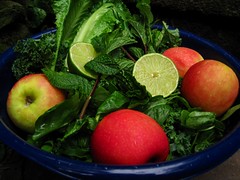Juicing vegetables is the latest trend for those who would class themselves as health freaks. It is supposed to be totally beneficial, because it allows us to consume loads of vitamins and minerals in a liquid. Liquids are easier to  digest. So, in theory, by juicing our vegetables, we get all the nutrition we need and more, but we also manage to lose weight, all the while never feeling hungry. However, is there any truth in this, or is juicing vegetables nothing more than pulp fiction – pun intended?
digest. So, in theory, by juicing our vegetables, we get all the nutrition we need and more, but we also manage to lose weight, all the while never feeling hungry. However, is there any truth in this, or is juicing vegetables nothing more than pulp fiction – pun intended?
Juiced is Healthy
Those on the side of stating that juiced vegetables are healthy are plentiful. Take The Windsor Star for instance, who cite top chef Ahron Goldman and fitness trainer Danielle Chevalier to propagate the tremendous benefits of juicing vegetables.
Drink up! Today you have more fresh, nutritious juices and smoothies at your fingertips than ever before.
And it seems from the rising sale of juicers on a national level that the vast majority of people agree with the perceived health benefits. The Windsor Star does, however, warn people to clearly understand the difference between a juice drink and a smoothie. Smoothies are blends, where the fiber is maintained. Juices are the juice of the fruit or vegetable, having removed the fiber and much of the protein.
Juicing Is Pulp Fiction
Then, there is the other side of the argument. Some say that the health benefits of juicing are nothing more than a PR technique to sell more juicers and that it is a technique that is working as proven by the statistics above. Evidently, the scientific and medical community does not recommend juicing vegetables as good way to lose weight. As stated in News Wise
Juicing in general reduces the fiber content and therefore decreases the feeling of fullness gained by eating fresh, crisp fruits and vegetables.
 In other words, some essential nutrients – the fiber – is removed from the vegetables, thereby leaving people to feel less full, in turn encouraging them to eat more. As such, they may actually make people put weight on because they eat more than they would have had they not consumed the juice. Besides this, drinking juice can potentially lead to the “dumping syndrome”, which has such side effects as nausea, vomiting and diarrhea.
In other words, some essential nutrients – the fiber – is removed from the vegetables, thereby leaving people to feel less full, in turn encouraging them to eat more. As such, they may actually make people put weight on because they eat more than they would have had they not consumed the juice. Besides this, drinking juice can potentially lead to the “dumping syndrome”, which has such side effects as nausea, vomiting and diarrhea.
Medical specialists agree that being healthy is about eating a healthy diet and engaging in regular physical exercise. Opting for any sort of “fad” when it comes to eating is never a good idea. Although most would not advocate that juicing is bad for you – even the dumping syndrome can be good in terms of detoxing your body – simply eating vegetables is a much better idea.
The Top and Bottom of It
So, to juice or not to juice, is that the question? The general consensus is that juicing is actually good for you, but only every so often or as part of a detox diet. Because the fibers in a juice have been removed, they can pass straight through the body. According to Colombia Metro
Those in favor of juicing say enzymes, vitamins and minerals are digested and assimilated within 10 to 15 minutes after consumption. Liquid flows directly to the small intestine because there is no fiber to slow absorption. They believe that fresh juice – sometimes called a liquid vitamin – is used almost entirely by the body for regeneration of cells and tissues with little effort on the part of the digestive system.
As always, the most important thing is to have a fully balanced lifestyle that includes fruits, vegetables, protein, healthy fats, minerals, vitamins and so on. Ditching fresh, crisp fruit and vegetables in its entirety for juices (or smoothies for that matter) is never a good idea. Replacing some with juices, however, could be good.
[hcshort id=”5″]
Rating:


